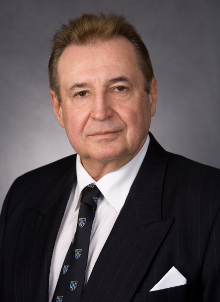 W
WHenkjan Honing is a Dutch researcher. He is professor of Music Cognition at both the Faculty of Humanities and the Faculty of Science of the University of Amsterdam (UvA). He conducts his research under the auspices of the Institute for Logic, Language and Computation (ILLC), and the University of Amsterdam's Brain and Cognition (ABC) center.
 W
WDavid Huron is a Canadian Arts and Humanities Distinguished Professor at the Ohio State University, in both the School of Music and the Center for Cognitive and Brain Sciences. His teaching and publications focus on the psychology of music and music cognition. In 2017, Huron was awarded the Society for Music Perception and Cognition Achievement Award.
 W
WKarl Rudolph Koenig was born in Königsberg of Prussia. Koenig was a businessman, instrument maker, and German physicist, chiefly concerned with acoustic phenomena. He was best known for designing and building acoustical instruments such as the tuning fork and sound analyser.
 W
WVladimir J. Konečni is an American and Serbian psychologist, aesthetician, poet, dramatist, fiction writer, and art photographer, currently an Emeritus Professor of Psychology at the University of California, San Diego.
 W
WDaniel Joseph Levitin, FRSC is an American-Canadian cognitive psychologist, neuroscientist, writer, musician, and record producer. He is the author of four New York Times best-selling books.
 W
WOliver Wolf Sacks, was a British neurologist, naturalist, historian of science, and writer. Born in Britain, Sacks received his medical degree from The Queen's College, Oxford in 1960, before moving to the United States, where he spent most of his career. He then interned at Mount Zion Hospital in San Francisco and completed his residency in neurology and neuropathology at the University of California, Los Angeles (UCLA). After a fellowship at the Albert Einstein College of Medicine, he served as neurologist at Beth Abraham Hospital's chronic-care facility in the Bronx, where he worked with a group of survivors of the 1920s sleeping sickness encephalitis lethargica, who had been unable to move on their own for decades. His treatment of those patients became the basis of his 1973 book Awakenings, which was adapted into an Academy Award-nominated film in 1990, starring Robin Williams and Robert De Niro.
 W
WFélix Savart was a physicist and mathematician who is primarily known for the Biot–Savart law of electromagnetism, which he discovered together with his colleague Jean-Baptiste Biot. His main interest was in acoustics and the study of vibrating bodies. A particular interest in the violin led him to create an experimental trapezoidal model. He gave his name to the savart, a unit of measurement for musical intervals, and to Savart's wheel—a device he used while investigating the range of human hearing.
 W
WCarl Emil Seashore, born Sjöstrand was a prominent American psychologist and educator. He was the author of numerous books and articles principally regarding the fields of speech–language pathology, music education, and the psychology of music and art. He served as Dean of the Graduate College of University of Iowa from 1908–1937. He is most commonly associated with the development of the Seashore Tests of Musical Ability.
 W
WRoger Newland Shepard is an American cognitive scientist and author of the "universal law of generalization" (1987). He is considered a father of research on spatial relations. He studied mental rotation, and was an inventor of non-metric multidimensional scaling, a method for representing certain kinds of statistical data in a graphical form that can be apprehended by humans. The optical illusion called Shepard tables and the auditory illusion called Shepard tones are named for him.
 W
WCarl Stumpf was a German philosopher, psychologist and musicologist. He studied with Franz Brentano at the University of Würzburg before receiving his doctorate at the University of Göttingen in 1868. He also tutored the modernist literature writer Robert Musil at the University of Berlin, and worked with Hermann Lotze, who is famous for his work in perception, at Göttingen. Stumpf is known for his work on the psychology of tones. He had an important influence on his students Wolfgang Köhler and Kurt Koffka who were instrumental in the founding of Gestalt psychology as well as Kurt Lewin, who was also a part of the Gestalt group and was key in the establishment of experimental social psychology in America. Stumpf is considered one of the pioneers of comparative musicology and ethnomusicology, as documented in his study of the origins of human musical cognition The Origins of Music (1911). He held positions in the philosophy departments at the Universities of Göttingen, Würzburg, Prague, Munich and Halle, before obtaining a professorship at the University of Berlin.